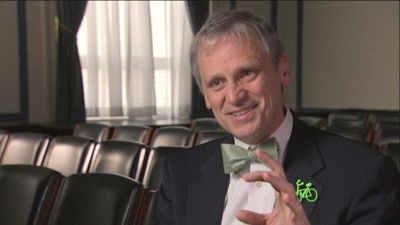Member of the United States House of Representatives (Oregon), 1996 –
Member of the Portland City Council, 1986 – 1996
on changing the american landscape
BLUEPRINT AMERICA: Paint me a picture of the future. Where is this country going and what does it imply in terms of population, in terms of growth? Can we continue just to build out on the horizon?
REP. EARL BLUMENAUER: Well, the bubble that hasn’t been given due attention after we’ve done real estate bubbles and auto bubbles and financial bubbles, is the demographic bubble – we are having an explosion. And we’re going to [have] 430, 440, 450 million people by mid century.
And, we’re going to have a much different population distribution. The typical household is changing. We’re moving from the Leave It To Beaver era where there were two, three, four kids in a household, two parents, suburban… We’re finding now there will be more single person households than families with children. At a time when we’re going to have way more than 400 million people in this country.
So, we have more people. We have more diversity. And we have much different needs and aspirations for these different groups. The only way we can accommodate it is with communities that are richer, that have more choices for movement where people live, and we strengthen the fabric of these existing communities rather than just abandon them and spreading out into the countryside. People don’t want to live that way. They can’t afford to build the infrastructure that way. And it won’t work.
BA: Just in terms of being clear, let me just ask directly – does our country need to get away from a narrow dependence on cars, highways as a means of getting around? Does that have to change?
EB: The American family needs more choices. They need more choices about how they move, where they live, the things that matter to them. One size fit all solutions are no longer applicable in today’s complex world. Well, an auto-dominated society, we find out, poses unique problems for people that don’t drive – problems with congestion, problems with space.
We do need to be able to take a step back – it starts with basic structures of land use. We went on a building construction spree that detached single-family dwellings as far as the eye could see, which ended up actually compromising choices for American families – requiring too many people to burn a gallon of gas to buy a gallon of milk, trapping them in their cars, making them hostage to increasingly complex scheduling requirements for children.
The whole range of things that rippled out from a decision to have suburban sprawl – that much maligned concept – but is very real. What we’ve found in today’s turmoil surrounding erratic energy prices and erratic housing prices that actually those communities that are more compact give people more choices – including many choices that are more cost-effective, actually hold their value and give more flexibility to the family.
BA: Will America change?
EB: It is changing. These policies are changing now. They’re changing, in part, because communities are in a situation where they can no longer rely on an auto only transportation system. They’re in a situation where we have far more suburban sprawl, detached single-family homes than the market can absorb.
And that was before the financial meltdown. We find that our demographics are changing. There’s a Baby Boomer turning 50 every eight seconds. Baby Boomers don’t want to maintain huge acreages in the suburbs. They want communities where there’s street life, where there are sidewalks, where they can have more manageable residences.
The commutes have gotten so bad in many communities that people have just had enough. They don’t want to waste the time, they can’t afford the money. So, we’re seeing trends across the country where already the adjustments are being made. And it’s a question of whether the Federal government will make the adjustments that catch up to where the American public is today.




